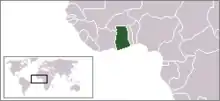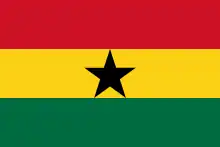ܓܢܐ
Assyrian Neo-Aramaic
Pronunciation
- (standard) IPA(key): [ˈɣɑːnɑː]
Derived terms
- ܓ݂ܵܢܵܝܵܐ (ḡānāyā, “Ghanaian”)
Pronunciation
- (standard) IPA(key): [ˈɡɑːneː]
Verb
ܓܵܢܹܐ • (gānē) (present participle ܓܢܵܝܵܐ (gnāyā), past participle ܓܸܢܝܵܐ (ginyā))
- to lie down, recline
- (with ܫܸܡܫܵܐ (šimšā, “sun”)) (of the sun) to set
- ܗ݇ܘܹܐ ܠܵܗ̇ ܒܸܓܢܵܝܵܐ ܫܸܡܫܵܐ ― wē lāh bignāyā šimšā ― The sun is setting.
- (with ܝܲܘܡܵܐ (yawmā, “day”)) (of the day) to get late, turn dark, turn into evening
- ܓܢܹܐ ܠܹܗ ܝܲܘܡܵܐ ― gnē lēh yawmā ― It got late. (literally, “The day reclined.”)
Conjugation
Conjugation of ܓܵܢܹܐ (gānē)
| singular | plural | ||||||
|---|---|---|---|---|---|---|---|
| 1st person | 2nd person | 3rd person | 1st person | 2nd person | 3rd person | ||
| past | m | ܓܢܝܼܐ ܠܝܼ (gnīyā lī) |
ܓܢܝܼܐ ܠܘܼܟ݂ (gnīyā lūḵ) |
ܓܢܝܼܐ ܠܹܗ (gnīyā lēh) |
ܓܢܝܼܐ ܠܲܢ (gnīyā lan) |
ܓܢܝܼܐ ܠܵܘܟ݂ܘܿܢ (gnīyā lāwḵōn) |
ܓܢܝܼܐ ܠܗܘܿܢ (gnīyā lhōn) |
| f | ܓܢܝܼܐ ܠܵܟ݂ܝ (gnīyā lāḵ) |
ܓܢܝܼܐ ܠܵܗ̇ (gnīyā lāh) | |||||
| non-past | m | ܓܵܢܐܹܢ (gānˀēn) |
ܓܵܢܐܹܬ (gānˀēt) |
ܓܵܢܹܐ (gānē) |
ܓܵܢܐܲܚ (gānˀaḥ) |
ܓܵܢܐܝܼܬܘܿܢ (gānˀītōn) |
ܓܵܢܐܝܼ (gānˀī) |
| f | ܓܵܢܐܵܢ (gānˀān) |
ܓܵܢܐܵܬܝ (gānˀāt) |
ܓܵܢܐܵܐ (gānˀā) | ||||
| imperative | m | ܓܢܘܿܐ (gnōwā) |
ܓܢܘܿܐܘܼܢ (gnōˀūn) |
||||
| f | ܓܢܘܿܐܝ (gnōˀy) | ||||||
Pronunciation
- (standard) IPA(key): [ˈɡan.neː]
Etymology 4
From Northern Kurdish گيان (giyan); related to Persian جان (jân). The sense of “self, oneself” is a calque of the original word ܪܘܼܚܵܐ (rūḥā), where this sense is not found in the Kurdish source word.
Alternative forms
- ܓܝܵܢܵܐ (gyānā)
Pronunciation
Inflection
| number | isolated forms | with possessive pronouns | |||||
|---|---|---|---|---|---|---|---|
| state | form | person | singular | plural | |||
| m | f | ||||||
| singular | absolute | – | 1st person | ܓܵܢܝܼ (gānī) |
ܓܵܢܲܢ (gānan) | ||
| construct | ܓܵܢ (gān) |
2nd person | ܓܵܢܘܼܟ݂ (gānūḵ) |
ܓܵܢܵܟ݂ܝ (gānāḵ) |
ܓܵܢܵܘܟ݂ܘܿܢ (gānāwḵōn) | ||
| emphatic | ܓܵܢܵܐ (gānā) |
3rd person | ܓܵܢܹܗ (gānēh) |
ܓܵܢܵܗ̇ (gānāh) |
ܓܵܢܗܘܿܢ (gānhōn) | ||
| plural | absolute | – | 1st person | ܓܵܢܵܬܝܼ̈ (gānātī) |
ܓܵܢܵܬܲܢ̈ (gānātan) | ||
| construct | ܓܵܢܵܬ̈ (gānāt) |
2nd person | ܓܵܢܵܬܘܼ̈ܟ݂ (gānātūḵ) |
ܓܵܢܵܬܵܟ݂ܝ (gānātāḵ) |
ܓܵܢܵܬܵܘ̈ܟ݂ܘܿܢ (gānātāwḵōn) | ||
| emphatic | ܓܵܢܵܬܹ̈ܐ (gānātē) |
3rd person | ܓܵܢܵܬܘܼ̈ܗܝ (gānātūh) |
ܓܵܢܵܬ̈ܘܿܗ̇ (gānātōh) |
ܓܵܢܵܬܗ̈ܘܿܢ (gānāthōn) | ||
This article is issued from Wiktionary. The text is licensed under Creative Commons - Attribution - Sharealike. Additional terms may apply for the media files.

